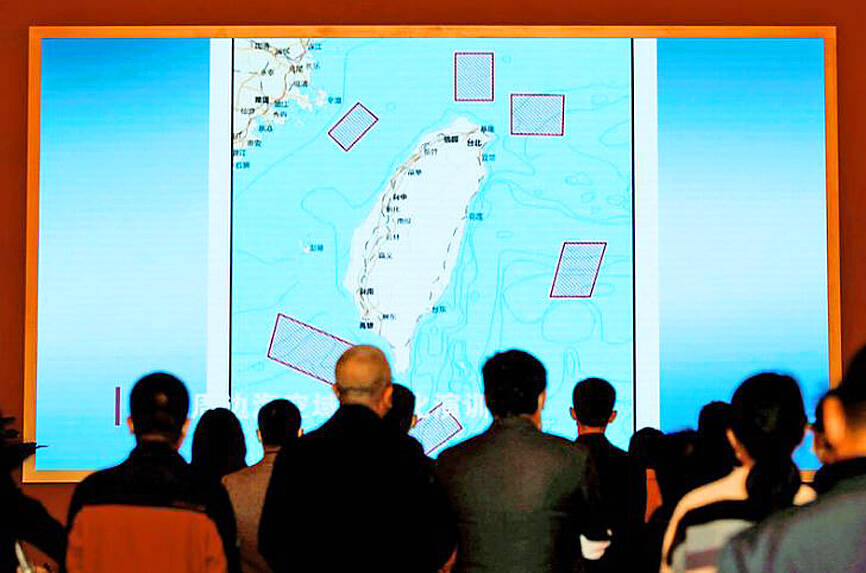China attempting to blockade Taiwan would be a mistake for Beijing, as US-led coalition forces would be able to circumvent it, a former US Department of Defense official said on Friday.
Former US Department of Defense senior director for China, Taiwan and Mongolia Tony Hu (胡振東) said in a media interview that the perception that China could cause Taiwan to collapse by blockading it for three weeks did not reflect reality.
“First, they can’t blockade Taiwan for three weeks,” Hu said in response to a question of how coalition forces would react if Chinese warships and planes surrounded Taiwan to prevent foreign military assistance.

Photo: Reuters
If China conducted a blockade without firing weapons it would still be an act of war under international law and “coalition forces could conduct anti-blockade operations by escorting supplies into Taiwan,” he said.
It would also not make sense for Beijing to use the tactic if its goal is to take Taiwan, he said.
“China hopes to take Taiwan in a quick victory,” and “a blockade is not going to give them a quick victory,” Hu said.
“If China does a blockade, it would give coalition forces so much time to build up and to move forces forward that the chance of them ever winning a conflict with Taiwan would be nil,” he said.
Hu also said that the current lack of joint military exercises between Taiwan and the US is a “hindrance” for Taiwan in preparing for a potential conflict in the Taiwan Strait.
He said he hoped that this would soon change, given provisions passed by the US Congress last year and in 2021 that called for Taiwan-US joint military training.
Even without joint exercises, Taiwan’s military is moving in the right direction by pursuing a joint C4ISR (command, control, communications, computers, intelligence, surveillance and reconnaissance) platform that is also used by the US military, which would improve the interoperability between the two forces and facilitate joint training, Hu said.
On countering China’s “gray zone” activities — an extension of the Chinese military short of outright military engagement that includes Chinese maritime militias harassing the Japan Coast Guard and chasing Philippine fishing boats away from their fishing grounds — he called for world governments to define who should be considered “combatants” and who should be considered “noncombatants,” a line that China has deliberately blurred.
For example, entities operating under the command of a semi-military organization such as the China Coast Guard should be classified as combatants and responded to accordingly, he said.
Chinese civilian hackers commissioned by Beijing to attack other countries’ financial systems or Internet infrastructure should be regarded and dealt with as combatants, he added.
The world needs to redefine the gray areas that China has been exploiting to gain an advantage over the rest of the world, including the information warfare that it is waging by planting disinformation in the media of other countries, he said.

An essay competition jointly organized by a local writing society and a publisher affiliated with the Chinese Communist Party (CCP) might have contravened the Act Governing Relations Between the People of the Taiwan Area and the Mainland Area (臺灣地區與大陸地區人民關係條例), the Mainland Affairs Council (MAC) said on Thursday. “In this case, the partner organization is clearly an agency under the CCP’s Fujian Provincial Committee,” MAC Deputy Minister and spokesperson Liang Wen-chieh (梁文傑) said at a news briefing in Taipei. “It also involves bringing Taiwanese students to China with all-expenses-paid arrangements to attend award ceremonies and camps,” Liang said. Those two “characteristics” are typically sufficient

A magnitude 5.9 earthquake that struck about 33km off the coast of Hualien City was the "main shock" in a series of quakes in the area, with aftershocks expected over the next three days, the Central Weather Administration (CWA) said yesterday. Prior to the magnitude 5.9 quake shaking most of Taiwan at 6:53pm yesterday, six other earthquakes stronger than a magnitude of 4, starting with a magnitude 5.5 quake at 6:09pm, occurred in the area. CWA Seismological Center Director Wu Chien-fu (吳健富) confirmed that the quakes were all part of the same series and that the magnitude 5.5 temblor was

The brilliant blue waters, thick foliage and bucolic atmosphere on this seemingly idyllic archipelago deep in the Pacific Ocean belie the key role it now plays in a titanic geopolitical struggle. Palau is again on the front line as China, and the US and its allies prepare their forces in an intensifying contest for control over the Asia-Pacific region. The democratic nation of just 17,000 people hosts US-controlled airstrips and soon-to-be-completed radar installations that the US military describes as “critical” to monitoring vast swathes of water and airspace. It is also a key piece of the second island chain, a string of

The Central Weather Administration has issued a heat alert for southeastern Taiwan, warning of temperatures as high as 36°C today, while alerting some coastal areas of strong winds later in the day. Kaohsiung’s Neimen District (內門) and Pingtung County’s Neipu Township (內埔) are under an orange heat alert, which warns of temperatures as high as 36°C for three consecutive days, the CWA said, citing southwest winds. The heat would also extend to Tainan’s Nansi (楠西) and Yujing (玉井) districts, as well as Pingtung’s Gaoshu (高樹), Yanpu (鹽埔) and Majia (瑪家) townships, it said, forecasting highs of up to 36°C in those areas